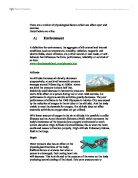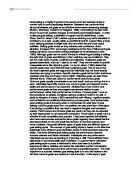Hot
The effects that hot climates have on the body are peripheral dilation of blood vessels which is affected by the autonomic nervous system upon detection by the thermal centre in the hypothalamus of an increase in core temperature. Warm blood is brought to the under surface of the skin, thus increasing the temperature gradient and encouraging convection of heat from the blood. This increase in peripheral blood flow causes an increase in the venous return to the heart, which in turn causes the heart rate to increase and a rise in cardiac output. Renal blood flow is reduced due to the sympathetic response and can lead to further complications. More serious effects can result in athletes suffering from heat illnesses such heat stroke. These include hematuria, myoglobinuria, clotting abnormalities and hepatic damage to name a few.
- Gender
The primary difference between males and females is the male sex hormone testosterone. Although this hormone is present in females, the much larger amounts in male’s accounts for the male primary and secondary sexual characteristics including body fat and muscle mass.
Testosterone is what makes male’s masculine, on the opposite females develop ovaries, which produce oestrogen leading to the development of female characteristics.
It is these differences in hormones which lead to the differences between males and females, these can be summarised as;
Physical size
Women in general tend to be physically smaller than men and have less muscle mass. This difference in size affects the absolute amount of physical work that can be performed by men and women. The lung capacity of men is 25 to 30 percent greater than that of women. This gives men still another advantage in the processing of oxygen and in doing aerobic work such as running. Women have less bone mass than men, but their pelvic structure is wider. This difference gives men an advantage in running efficiency.
(Adopted from http://www.fitness-training.net/introduction/20/)
Body fat percentage
Women carry about 10 percentage points more body fat than do men of the same age. This gives women greater buoyancy in water which makes them better suited to swim the channel. Men accumulate fat primarily in the back, chest, and abdomen; women gain fat in the buttocks, arms, and thighs. Also, because the center of gravity is lower in women than in men, women must overcome more resistance in activities that require movement of the lower body.
Effects of exercise
The average woman's heart is 25 percent smaller than the average man's. Thus, the man's heart can pump more blood with each beat. The larger heart size contributes to the slower resting heart rate (five to eight beats a minute slower) in males. This lower rate is evident both at rest and at any given level of sub-maximal exercise. Thus, for any given work rate, the faster heart rate means that most women will become fatigued sooner than men.
- Race
It is clear that certain races are better suited to certain sports. African athletes dominate both short and long difference running events, throwing and swimming events are dominated by white athletes. Asians will flourish in diving, gymnastics and table tennis, while Indians are good at field hockey.
West African
These athletes have dominated the explosive sprint events, the fastest 200; 100m times are all by black athlete. Research suggests that these athletes have;
- Lower body fat
- Longer legs
- Narrow hips
- Greater muscles mass
- Higher bone mineral density
- Higher levels of testosterone
- Higher percentage of fast twitch fibres
These factors suggest that West African athletes are better suited to sprinting than long distance running.
East African
These athletes have dominated the middle/long distance running events for some time. The top 60 times for the 3000m steeplechase are all held by Kenyan athletes. The vast majority of top Kenyan runners live in a region that is at high altitude, this has lead scientists that their adaptation to living at high altitude has given them an increased athletic prowess at endurance events.
Although east Africans are fanatic about football they are among the worst in the world, this is because of their physiology.
Genetical make-up plays apart in their running success- they are ectomorphs, short and very slender with;
- Huge natural lung capacity.
- High slow twitch muscle fibre percentage.
- Have a greater number of red blood cells
- More energy producing enzymes in muscles
Caucasian athletes
The body type of whites falls in between west and east African athletes. They tend to have more natural upper body strength as they have a mesomorphic body type. White athletes tend to dominate strength sports such as throwing and weightlifting.
Also whites tend to dominate swimming; African athletes are thought to have heavier bones and smaller chest cavities, which affect their buoyancy.
- Physiological aides
Athletes can take drugs for several reasons. An athlete may want to:
-
Build mass and strength of muscles and/or bones
-
Increase delivery of oxygen to exercising tissues
-
Mask pain
-
Stimulate the body
-
Relax
-
Reduce weight
-
Hide use of other drugs
Different drugs and their effects
One of the more commonly used drugs is steroids. Steroids are drugs derived from hormones. Anabolic steroids are one group of these drugs.
Anabolic steroids - or more precisely, anabolic/androgenic steroids - belong to a group known as ergogenic, or so-called 'performance-enhancing,' drugs. They are synthetic derivatives of testosterone, a natural male hormone. 'Anabolic' means growing or building. 'Androgenic' means masculinizing or generating male sexual characteristics.
Consequences of steroid abuse
For men
Men who take large doses of anabolic steroids typically experience changes in sexual characteristics. Although derived from a male sex hormone, the drug can trigger a mechanism in the body that can actually shut down the healthy functioning of the male reproductive system. Some possible side effects are:
- Shrinking of the testicles
- Reduced sperm count
- Impotence
- Baldness
- Difficulty or pain in urinating
- Development of breasts
- Enlarged prostate
For women
Females may experience 'masculinisation' as well as other problems such as:
- Growth of facial hair
- Changes in or cessation of the menstrual cycle
- Enlargement of the clitoris
- Deepened voice
- Breast reduction
For both sexes
For both men and women, continued use of anabolic steroids may lead to health conditions ranging from merely irritating to life-threatening. Some effects are:
- Acne
- Jaundice
- Trembling
- Swelling of feet or ankles
- Bad breath
- Reduction in HDL, the 'good' cholesterol
- High blood pressure
- Liver damage and cancers
- Aching joints
- Increased chance of injury to tendons, ligaments, and muscles
Many athletes report 'feeling good' about themselves while on a steroids regimen. Yet large mood swings are commonly seen, ranging from periods of aggression to bouts of depression when the drugs are stopped.
EVALUATION
We were put into a group of four; we all sat around a table and discussed which of the four choices we were going to do.
Out of a choice of producing a board game, a comprehensive quiz, a video and an information resource pack. We collectively decided to produce a comprehensive quiz.
How we planned it
After deciding what we were going to do the next step was to decide how to present the quiz. We came up with the idea of a trivial pursuit style game, where each colour represented a different topic. Players would be given a topic and asked a question on it. Two points will be awarded for a correct answer.
The four different topics were
- Environment- Red
- Gender- Green
- Race- Blue
- Physiological aides- Yellow
Because a spinner was difficult to make, we decided to make a dice, with the four different colours on four sides and an option on the other two sides.
Each member of the team was given a topic to research into and produce questions for it. My specific topic was the environment. I looked on the internet and in books and came up with questions and answers on the effects altitude, hot environments and cold environments had on sport and exercise. Including questions on the effect of some illness caused by the environment. I also made the dice, by drawing a net of a cube, scoring it and cutting it out. Then sticking it together and colouring the sides.
The final product was four sets of questions each set in its own pocket and coloured according to the topic. Participants were split into two teams and played against each other. I feel that overall our team worked well together and we all played our part in producing the final product.
I think that some of the questions asked were not as good as others; this could have been because insufficient research was done on certain topics.







